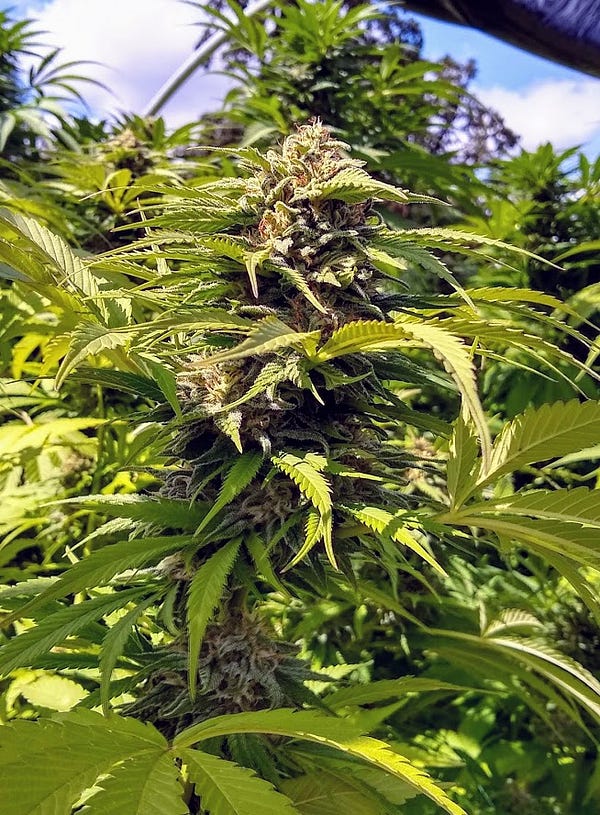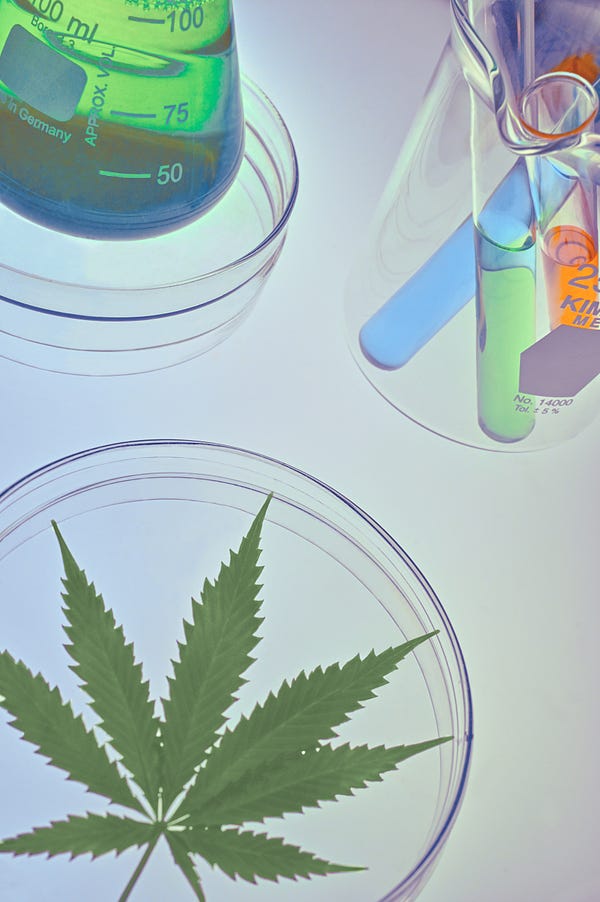THC Chasing is Killing Honest Growers, Labs, and Retailers
Provocative, click-baity title, I know, but cannabis lovers — I need your attention because we need to talk about something serious. We aren’t doing right by this plant that gives so much. Chasing the highest THC (‘THC Chasing’) when purchasing at dispensaries has the potential to kill this industry by eliminating the honest growers, labs, and retailers. The obsessive, misguided focus on THC is working against everyone touched by the cannabis industry.
Cannabis education has never been more important than NOW. We need to teach people about all of the cannabinoids, terpenes, VSC’s, and everything that goes into experiencing cannabis to stop the madness.
When reported spikes in THC values in the Oregon marketplace came to my attention, I started asking friends and clients within the industry for their thoughts. One thing is for certain — this is a massive elephant in the room, because as soon as I started talking about lab values with the budtenders at my local dispensary, they literally named a lab that they had been seeing high values from. Anecdotes started coming to me about farmers shopping their cannabis in order to find favorable lab results.
There’s a few things that could be contributing to a spike, and they range from awesome to nefarious:

Oregon weed just is that kick-ass.
Awesome!
Let’s be clear about one thing, though. Oregon grows EXCEPTIONAL cannabis, and I don’t want to discount that at all. Far from it — I want to be sure that our labs can appropriately quantify the amazing work our growers are able to achieve.
I can expound on this point for hours, but we grow exceptional cannabis here.
Cannabis is a Living Thing, and That Always Makes Things Weird
Awesome!
Cannabis really can be exceptionally varied, and two buds off the same branch can have different test results. Biologicals are strange that way, and it’s a nature of the plant that the material that was tested will vary from the material in the packaging. This is especially true when tests can be performed on very large batches. Think of it this way — if you’re sampling a bit of weed from a 50 pound batch, that’s very different from taking a sample from an ounce from the dispensary.
Differences in Lab Processes Impact the Findings.
In the current climate, this is just to be expected!
A lot of people forget that there are quite a few steps to testing cannabis, and those that work testing cannabis can’t just ‘pop a bud in’ and see what is in it. One of the most important is a step called homogenization, which is where the sample is processed to the point that it can be effectively mixed and sampled. The way that labs perform this process is varied, and can range from grinding it up to something far more proprietary.
This step is essential to ensuring appropriate sampling methods, and can introduce variability in lab results. When this is coupled with nuances on how instruments are calibrated, the impact has the potential to be significant.
Errors in Process
Also to be expected, but too many errors indicate a deeper process issue!
People make mistakes! What’s important is that labs have processes with checks built in.
Producers are Intentionally Engaging in Behavior to Spike their Results.
Kiefing the batch — Not Great. Lab shopping? Nefarious.
This ranges from ‘kiefing the batch’ (where kief is redistributed over batches for testing) to producer sampling where they pick the best buds from their flower. I would also include lab shopping itself under this, as well as putting pressure on lab employees to give them a better number.
Rogue Labs are Intentionally Producing Higher THC Results.
Super bad nefariousness, and it can have impacts on patient safety, in addition to impacting those who have to transport hemp.
Labs are performing calibrations and other adjustments that are within the scope of regulation but still allow a change of up to 30% in some results. There are apparently other methods where outright falsification can occur.
Is Something Going On?

I’ve talked to around fifty people in the industry and I’m going to say yes, but without a comprehensive project to eliminate laboratory nuances as the cause, it’s hard to say exactly what for certain.
We know that this has happened before, and this is where the obsession with THC has become deleterious for the cannabis industry. I’ve been talking with laboratories, farmers, and retailers in an effort to take on a project to get to the bottom of the variances.
One thing is for certain — because THC has become such a valued number by retailers, it is highly prone to manipulation.
I’ve written about the results of ORELAP’s 2019 audit of labs before, and I wasn’t surprised to hear about this practice again. The 2019 audit found several gaps in Oregon’s implementation and had a series of 23 recommendations aimed to righting the course. As a medical patient, it’s unsettling how we were used to help legalize cannabis, yet our health and access to medication is no longer of import to the cannabis industry. This is laid bare by the gaps in the regulations that allow cannabis to be sold to medical patients without testing at all. While the lack of heavy metals and microbiological testing across both medical and recreational are distressing (and have been supposedly addressed in recent regulations), it isn’t as distressing as the fourth finding: “Without a mechanism for verifying test results, Oregon’s marijuana testing program cannot ensure that test results are reliable and products are safe. Limited authority, inadequate staffing, and inefficient processes reduce OHA’s ability to ensure Oregon marijuana labs consistently operate under accreditation standards and industry pressures may affect lab practices and the accuracy of results”
The data in the paper above reflected Washington state cannabis lab results from 2014 to 2017. Since then, in Washington state, some laboratories are members of a coalition called the Cannabis Alliance. While the alliance has a broad mission and is comprised of people from across the industry (including patients!), one of the alliance’s many accomplishments was running intra-lab round-robin activities.
Because of the pressure on labs, producers, and retailers around THC percentages, the THC obsession is creating a toxic marketplace in which those that want to engage in fair business practices are being left behind. There are several ways that this can be addressed on the industry-level. One of the fastest and most effective would be for cannabis laboratories to form coalitions to self-regulate within the industry and to help brand products that had been tested using the set of standards they create.
What Can Consumers Do?
Get to know the Farms, Labs, and Retailers in Your State / Area
The most meaningful change would be if we, the consumer, began to make our voices heard regarding the importance of accurate testing. Begin to understand the testing rules in your area, and start to familiarize yourself with the farms, labs, and retailers that give you the experience you are seeking.
Educate others on the world beyond THC
Cannabis has so much to offer, and THC is only one tiny piece of the experience. It’s important that those of us that know of the many aspects of this plant help others to discover the world of cannabis beyond just THC. We have to help people realize that THC is like ABV in wine. Yes, it’s an informative number — but it’s not wholly indicative of the experience, and it shouldn’t become the sole driver of this important industry.
What do YOU think?
Article Sources:
Leading Cannabis Platform Providers Form Open Standards Technology Alliance in State of Washington
SEATTLE, Oct. 13, 2021 /PRNewswire/ — Cultivera, Dauntless, GrowFlow, OpenTHC, POSaBit, Treez (DBA Mister Kraken in…www.prnewswire.comThe frequency distribution of reported THC concentrations of legal cannabis flower products…
Background Cannabis laboratory testing reliability is a scientific and policy challenge in US states with legal…jcannabisresearch.biomedcentral.comVariation in cannabis potency and prices in a newly legal market: evidence from 30 million cannabis…
Rosanna Smart , Jonathan P.onlinelibrary.wiley.comCannabis Lab Testing Continues to Evolve in Washington | Continuing Education
The cannabis industry in Washington State has gone through a considerable evolution since the first recreational store…ce.seattlecentral.eduManipulation of Procurement Contracts: Evidence from the Introduction of Discretionary Thresholds
Manipulation of Procurement Contracts: Evidence from the Introduction of Discretionary Thresholds by Ján Palguta and…www.aeaweb.org40% THC Flower?! How Lab Shopping and THC Inflation Cheat Cannabis Consumers
A landmark Leafly review finds endemic lab shopping and THC inflation in legal cannabis, five years into…www.leafly.com
https://thecannabisalliance.us/accomplishments/Do You Know What’s in Your “Legal” CBD or THC Vape?
It’s been more than two years since frightening stories of young people rushed to emergency rooms with severe breathing…cannabisnow.comCan Washington fix its broken cannabis lab testing system?
Nearly five years after the first legal sales of adult-use cannabis in Washington, lawmakers and regulators seem to…www.leafly.comHemp’s stumbles reveal hurdles in Wyoming’s race to diversify – WyoFile
Thanks for your support of WyoFile! We rely on loyal members like you to sustain our reporting and grow the WyoFile…wyofile.com
By Jamie Toth, The Somewhat Cyclops on .
Exported from Medium on December 20, 2021.